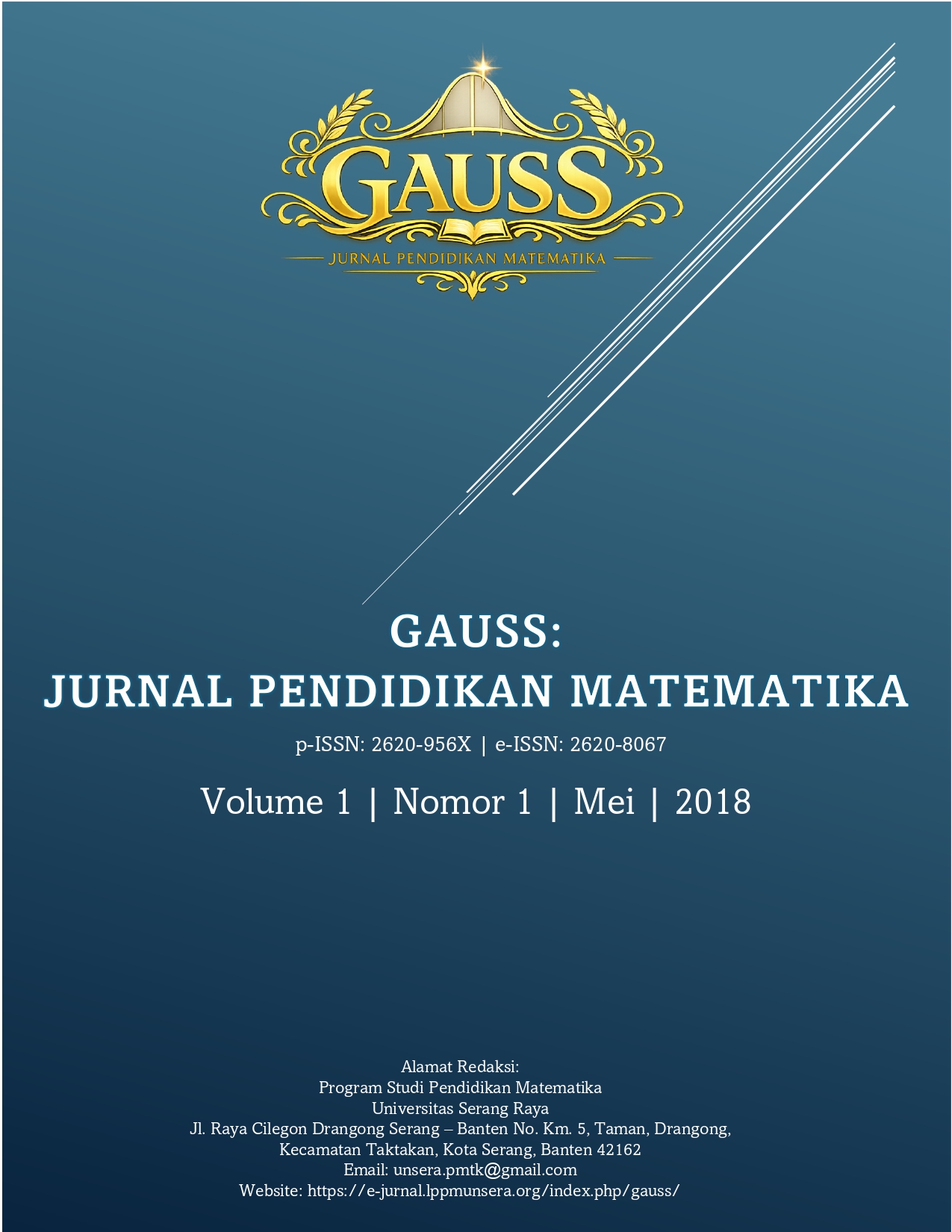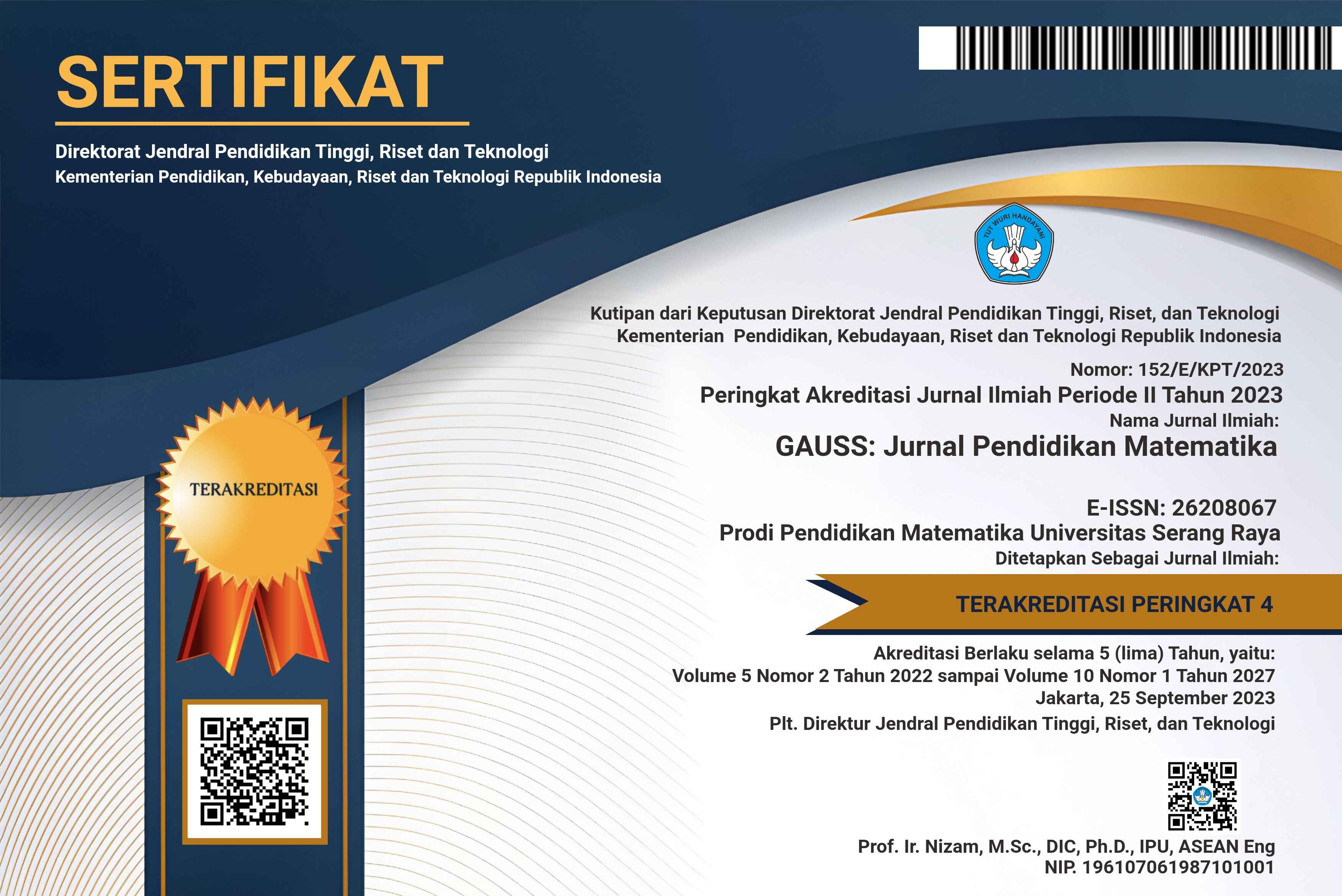Pengaruh Experiential Learning dan Kreativitas Siswa SDN Pelamunan Kabupaten Serang Terhadap Hasil Belajar Matematika
DOI:
https://doi.org/10.30656/gauss.v1i1.638Kata Kunci:
Experiential Learning, Creativity, Result Of LearnAbstrak
The main purpose of this research is to know the influence and interaction between experiential learning model and student creativity toward the result of mathematic learning.Population of this research is student of VIA and VIB class SDN Pelamunan Serang, 2017/2018 year. Sample of this research is taken by using Multi Stage Random Sampling. Research design used in this research is factorial design 2X2 with three variables which contains two independent variables are experiential learning model and student creativity; and one dependent variable is the result of mathematic learning.Collecting of the data is conducted by using test technique (the result of mathematic learning), questioner technique (student creativity) and document technique (experiential learning model). Data collected is analyzed by using ANAVA two sides and it is continued with the tukey test because there is influence between experiential learning models with student creativity toward the result of mathematic learning. Before the data is being analyzed, it is conducted descriptive statistical analysis and data testing (normality and homogeneity tests). Result of the research shows that: (1) experiential learning model gives influence to the result of mathematic learning, it is showed by the result of anava where F count is (11,589) more and F-table for the significance level 5% (4,00); (2) student creativity gives influence to the result of mathematic learning, it is showed by the result of anava where the F-count (33,362) more than F-table for the significance level 5% (4,00); (3) there is interaction between experiential learning model and student creativity toward the result of mathematic learning, it is showed by F count (4,627) more than F table for the significance level 5% (4,00); (4) there is influence of the result of mathematic learning with experiential learning concept for the student’s creativity, it is showed by the result of tukey test where the count test (17, 91) higher than t test.Referensi
Beard, C. dan Wilson, J.P. (2006). Experiential Learning: A best Practice Handbook for Educators and Trainers. London & Philadelpia: Kogan Page.
Budiningsih, C.A. (2005). Belajar dan Pembelajaran. Jakarta: Rineka Cipta.
Depdiknas. (2003). Undang-undang Republik Indonesia Nomor 20 Tahun 2003 tentang Sistem Pendidikan Nasional. Jakarta: Biro Hukum dan Organisasi Depdiknas.
Fathurrahman. (2015). Model-model Pembelajaran Inovatif. Yogjakarta: Ar-Ruzz Media.
Hamalik, O. (2012). Kurikulum dan Pembelajaran. Jakarta: Bumi Aksara.
Kolb, D. (1984). Experiential Learning, Experiential as the Source of Learning and development. New York: International Inc Publishing.
Mohammad, A. dkk. (2009). Psikologi Remaja. Jakarta: Bumi Aksara.
Oktaviyanthi, R. (2015). Kajian Model Pembelajaran: Pendekatan Cognitive Apprenticeship Model Case Based Reasoning Dalam Pembelajaran Matematika. Artikel dipresentasikan pada Seminar Nasional Matematika 2015, Universitas Katolik Parahyangan, Bandung. (Online), (http://doi.org/10.17605/OSF.IO/H7ER2, diakses 22 September 2017).
Oktaviyanthi, R., Safaah, E., dan Agus, R. N. (2017). Pemberdayaan Keterampilan Guru Matematika dalam Menyusun Bahan Ajar Berbantuan Mathematics Education Software. Jurnal Pengabdian Masyarakat Wirakrama Parahita, (1) 1, 19-24. (Online), (http://e-jurnal.lppmunsera.org/index.php/parahita/article/view/270/523, diakses 10 Januari 2018).
Oktaviyanthi, R. dan Dahlan, J.A. (2018). Developing Guided Worksheet for Cognitive Apprenticeship Approach in Teaching Formal Definition of the Limit of A Function. IOP Conference Series: Materials Science and Engineering 335 (1), 012120. (Online), (http://iopscience.iop.org/article/10.1088/1757-899X/335/1/012120/pdf, diakses 25 April 2018).
Sheffield, L. J. (2003). Extending the challenge in mathematics: Developing mathematical promise in K-8 students. Thousand Oaks, CA: Corwin Press.
Uno, H.B. (2010). Orientasi Baru dalam Psikologi Pembelajaran. Jakarta: Bumi Aksara.
Warsita, B. (2008). Teknologi Pembelajaran: Landasan & Aplikasinya. Jakarta: Rineka Cipta.
Yamin, M. (2010). Strategi Pembelajaran Berbasis Kompetensi. Jakarta: Persada.
Unduhan
Diterbitkan
Terbitan
Bagian
Lisensi
Authors who publish articles in GAUSS : JURNAL PENDIDIKAN MATEMATIKA agree to the following terms:
- Authors retain copyright and grant the journal the right of first publication with the work simultaneously licensed under a Creative Commons Attribution-ShareAlike 4.0 International License that allows others to share the work with an acknowledgment of the work's authorship and initial publication in this journal.
- Authors are able to enter into separate, additional contractual arrangements for the non-exclusive distribution of the journal's published version of the work (e.g., post it to an institutional repository or publish it in a book), with an acknowledgment of its initial publication in this journal.
- Authors are permitted and encouraged to post their work online (e.g., in institutional repositories or on their website) before and during the submission process, as it can lead to productive exchanges, as well as earlier and greater citation of published work (See The Effect of Open Access).




